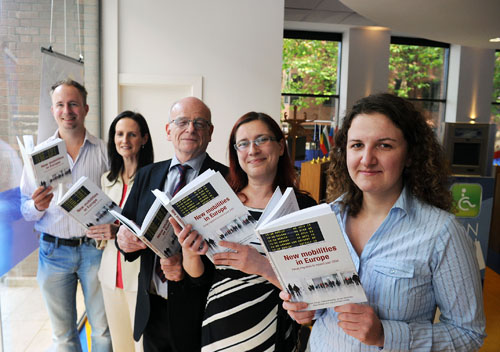New Patterns of European Migration Explored at Trinity Symposium
Posted on: 17 September 2013
Young European migrants are highly mobile and are motivated by work, self-development and quality of life, according to new research which was presented at a symposium at Trinity College Dublin.
Entitled New European Mobilities: Education, Migration and Employment, the event, organised by Trinity’s Employment Research Centre (ERC) in association with the College’s Institute for International Integration Studies (IIIS), focused on new European migrant experiences including lifestyle migration; education and the relationship with employability and mobility, the need for portable social protections and the impact of migration on national welfare systems.
A highlight of the symposium was the publication of the report Learning from Poland: First Reflections. The research comprises over 150 interviews with Polish migrants over six years and Irish graduates interviewed in 2013, along with an online graduate survey. It traced Polish nationals careers and aspirations in the 2000s as Ireland moved from ‘boom to bust’ and also captured the motivations and experiences of recent Irish graduates to London, Sydney, Perth and Melbourne in a recessionary economic context.

Pictured at the launch of the book New Mobilities in Europe: Polish Migration to Ireland post-2004 were authors Professor Torben Krings, Johannes Kepler University Linz; Assistant Professor in Sociology at Trinity College Elaine Moriarty; Professor James Wickham, Dean of the Faculty of Arts, Humanities and Social Science, Trinity College; Dr Alicja Bobek, research fellow at Trinity College, and Dr Justyna Salamonska, visiting research fellow, Trinity College.
The research, conducted by Trinity’s Employment Research Centre (ERC), highlights how present-day migrants are engaging in new forms of migration. While traditional patterns of move-work-settle can still be found, international mobility today also often takes the form of commuting and serial migration. The research also found that quality of life and self-development are a key motivation for present-day migrants.
Key Findings:
- Migration was perceived by participants as an opportunity for improved quality of life and a chance for self-development and gaining a new perspective on their professional and personal lives.
- New patterns include serial migration; stepping stone migration, where people relocated onwards; and exploratory migration, where people use one country as a base for a move to another country.
- Although some of those interviewed had truly ‘dropped anchor’, many seemed to operate with a sense of onward movement, ‘with a suitcase at the ready’.
- Migrant networks play an important role for the participants, even for those who had skills and, in the case of Polish migrants in Ireland, high levels of English language proficiency.
Speaking at the symposium Professor James Wickham, Dean of the Faculty of Arts, Humanities and Social Sciences, and lead author of the report commented: “Migration is still normally understood as the permanent move from one country to another in order to work and settle. However, our research examining the strategies and experiences of recent Irish graduate emigrants with those of high-skilled Polish migrants highlights new patterns of migration among young Europeans. Present day migrants are no longer solely motivated by employment opportunities but rather seek out personal development and improved quality of life. They are highly mobile, often engaging in circular or serial migration and open to further mobility.”
“The Polish and Irish groups interviewed are a new generation of mobile Europeans who exhibit a capacity to be mobile across national borders and across transnational labour markets. Whatever paths our Polish and Irish participants may pursue, we anticipate that these new mobility trends will continue to develop.”
Following the symposium, the Polish Ambassador to Ireland Mr Marcin Nawrot launched a new book entitled New Mobilities in Europe: Polish Migration to Ireland post-2004 (Manchester University Press).
Media Coverage:
- RTE Radio 1, Drivetime, September 17th, 2013 (Scroll through to 02.08.08)
- Irish Times, September 18th, 2013, Australia’s new Irish aren’t ‘victims of emigration’
- Irish Times, September 20th, 2013, Emigrants are more mobile and career-centred than ever
- Irish Times, September 15th, 2013, Perceptions of emigration as permanent move are ‘outdated’ according to study
- Irish Independent, September 17th, 2013, Graduates who emigrate return after securing job experience
For media queries contact:
Fiona Tyrrell, Press Officer for the Faculty of Arts, Humanities and Social Sciences, Trinity College Dublin at tyrrellf@tcd.ie or Tel: + 353 1 8964337
